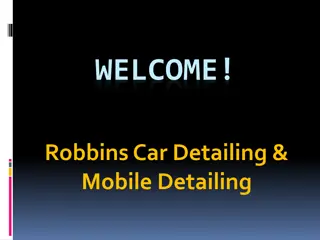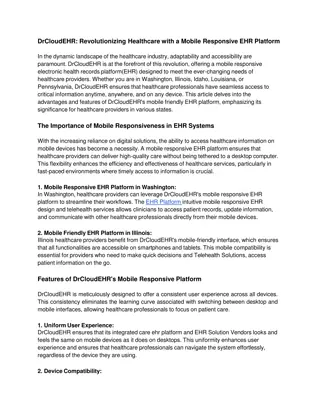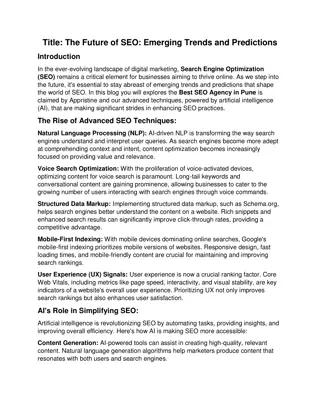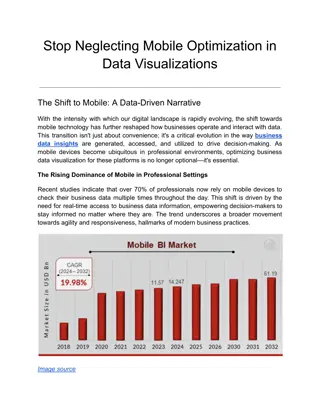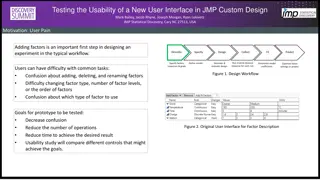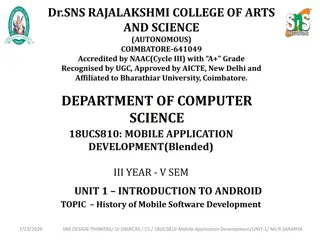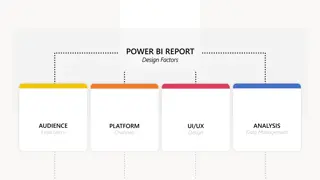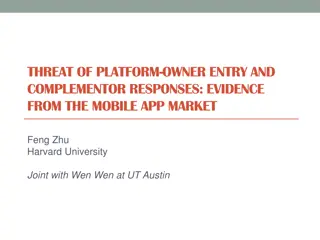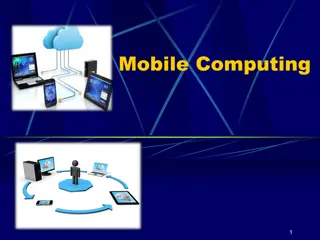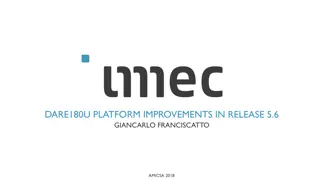Guide to Mobile User Experience Design Choices & Platform Selection
Explore platform choices, deciding between responsive websites and native mobile apps, and rethinking mobile web concepts in this comprehensive guide to designing user experiences for mobile. Learn about the benefits of both responsive websites and native mobile apps, and understand the importance of considering user needs and behaviors when designing for mobile platforms.
Download Presentation

Please find below an Image/Link to download the presentation.
The content on the website is provided AS IS for your information and personal use only. It may not be sold, licensed, or shared on other websites without obtaining consent from the author.If you encounter any issues during the download, it is possible that the publisher has removed the file from their server.
You are allowed to download the files provided on this website for personal or commercial use, subject to the condition that they are used lawfully. All files are the property of their respective owners.
The content on the website is provided AS IS for your information and personal use only. It may not be sold, licensed, or shared on other websites without obtaining consent from the author.
E N D
Presentation Transcript
The complete guide to Designing Mobile User Experiences 3) Platform Choices Resources @shoobe01 4ourth.com 1
Platform Choices Read More: We'll get to more of this in the next two lessons, so I've reserved the detailed references there, but here are a few more articles to review so you may think about how we frame mobile needs, and how devices are used. 2
Web vs. native: lets concede defeat http://www.quirksmode.org/blog/archives/2015/05/web_vs_native_l.html BONUS New since the original presentation, PPK posted a linkbait headline article that in fact addresses the exact point I make: There s no either/or, but they each have their own points and it s dumb to try to emulate native on Web. Let it be the Web! It s time to recognise that this is the wrong approach. We shouldn t try to compete with native apps in terms set by the native apps. Instead, we should concentrate on the unique web selling points: its reach, which, more or less by definition, encompasses all native platforms, URLs, which are fantastically useful and don t work in a native environment, and its hassle-free quality. 3
How to decide between a responsive website or a native mobile app http://thenextweb.com/dd/2014/02/08/decide-responsive-website-native- mobile-app/ Long, detailed article, but it does start with the basic premise that they do different things, so it may not be a choice. If your company can afford it, it s highly recommended that you build both a responsive site and a native mobile app in order to help your business work towards capturing the attention of your entire mobile audience. The native mobile app will provide a mobile centric experience for your existing and most loyal customers, while your responsive website can help provide an optimized experience to new and old visitors browsing your website or discovering it for the very first time. 4
Rethinking What We Mean by Mobile Web http://daringfireball.net/2014/04/rethinking_what_we_mean_by_mobile_we b I am pretty sure I don t agree with this movement, to make Web = = Internet, but for our purposes the concept is nice, to get out of the either/or mindset. We shouldn t think of the web as only what renders inside a web browser. The web is HTTP, and the open Internet. What exactly are people doing with these mobile apps? Largely, using the same services, which, on the desktop, they use in a web browser. Plus, on mobile, the difference between apps and the web is easily conflated. When I m using Tweetbot, for example, much of my time in the app is spent reading web pages rendered in a web browser. Surely that s true of mobile Facebook users, as well. What should that count as, app or web ? 5
To Wash It All Away http://research.microsoft.com/en-us/people/mickens/ToWashItAllAway.pdf A PDF, but a good one so don t let that scare you off. Not least as it s just funny as hell. The World Wide Web Consortium (W3C) provides official specifications for many client-side Web technologies. Unfortunately, these specifications are binding upon browser vendors in the same way that you can ask a Gila monster to meet you at the airport, but that gila monster may, in fact, have better things to do It does settle down, and is specific, not just a griping rant, but is good background if you think the Web can do anything, easily. 6
The Comprehensive App Economics Blog 2014 http://communities-dominate.blogs.com/brands/2014/08/the- comprehensive-app-economics-blog-2014-yes-peak-app-is-apt-name-sheer- disaster-industry-with-only.html 3.8% of smartphone app developers are able to turn some profit. Yes over 96% of smartphone app developers lose money on the project. Only 1.3% of developers have a hit product. This is essentially 10 times worse than normal hits businesses. Your chances of success are nearly as bad as 1 in 100. You are better off learning to rap or writing a book. An app alone won t make you rich and famous. A website is no better. Have a good business, a service people want to pay for, first. Mobile is huge, but it s not magic. 7
App developer trends Q1 2015 http://www.visionmobile.com/blog/2015/02/app-developer-trends-q1-2015/ Vision Mobile (who provided much of the data on the previous slide s link) disagrees with Tomi a bit. But only in details. Even their numbers show a wild disparity between high and low profit app developers. 8
Tools dont solve the webs problems, they ARE the problem http://www.quirksmode.org/blog/archives/2015/05/tools_dont_solv.html Don t get caught up in false choices and trends. There are those who want to build apps because they are faster but they don t have to be. Web does not have to emulate native, web has to capitalise on its own strengths, primarily its reach, which still outstrips native and will continue to do so as long as we have more than one native platform the solution is simple: ditch the tools. All of them. (No, I m not being particularly subtle here.) Teach the newbies proper web development. That s it, really. 9








